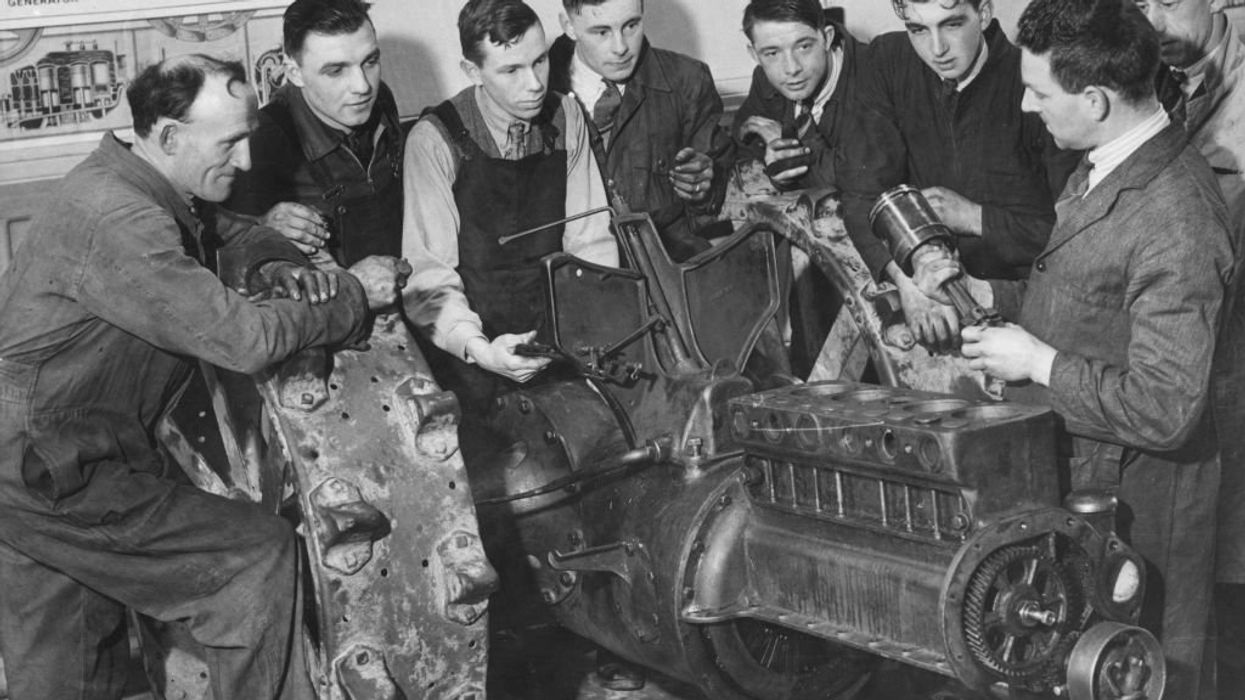Story by the Associated Press; curated by Dave Urbanski
BAGHDAD (AP) — Kurdish authorities in Iraq said Saturday they have evidence that the Islamic State group used chlorine gas as a chemical weapon against peshmerga fighters, the latest alleged atrocity carried out by the extremist organization now under attack in Tikrit.
The allegation by the Kurdistan Region Security Council, stemming from a Jan. 23 suicide truck bomb attack in northern Iraq, did not immediately draw a reaction from the Islamic State group, which holds a third of Iraq and neighboring Syria in its self-declared caliphate. However, Iraqi officials and Kurds fighting in Syria have made similar allegations about the militants using the low-grade chemical weapons against them.
 In this undated photo made available Saturday, March 14, 2015, by the Kurdistan Region Security Council (KRSC), a piece of debris that the Kurdistan Region Security Council said is a gas canister lies at the site of a bomb attack on a road between Mosul, Iraq, and the Syrian border in northern Iraq. (Image source: AP/Kurdistan Region Security Council)
In this undated photo made available Saturday, March 14, 2015, by the Kurdistan Region Security Council (KRSC), a piece of debris that the Kurdistan Region Security Council said is a gas canister lies at the site of a bomb attack on a road between Mosul, Iraq, and the Syrian border in northern Iraq. (Image source: AP/Kurdistan Region Security Council)
In a statement, the council said the alleged chemical attack took place on a road between Iraq's second-largest city, Mosul, and the Syrian border, as peshmerga forces fought to seize a vital supply line used by the Sunni militants. It said its fighters later found "around 20 gas canisters" that had been loaded onto the truck involved in the attack.
Video provided by the council showed a truck racing down a road, white smoke pouring out of it as it came under heavy fire from peshmerga fighters. It later showed a white, billowing cloud after the truck exploded and the remnants of it scattered across a road.
An official with the Kurdish council told The Associated Press that dozens of peshmerga fighters were treated for "dizziness, nausea, vomiting and general weakness" after the attack. He spoke on condition of anonymity as he was not authorized to discuss the incident.
The Kurds say samples of clothing and soil from the site were analyzed by an unnamed lab in an unnamed coalition partner nation, which found chlorine traces.
"The fact ISIS relies on such tactics demonstrates it has lost the initiative and is resorting to desperate measures," the Kurdish government said in the statement, using an alternate acronym for the Sunni militant group.
 In this undated photo made available Saturday, March 14, 2015, by the Kurdistan Region Security Council (KRSC), Kurdish soldiers walk around the site of a bomb attack on a road between Mosul, Iraq, and the Syrian border in northern Iraq. (Image source: AP/Kurdistan Region Security Council)
In this undated photo made available Saturday, March 14, 2015, by the Kurdistan Region Security Council (KRSC), Kurdish soldiers walk around the site of a bomb attack on a road between Mosul, Iraq, and the Syrian border in northern Iraq. (Image source: AP/Kurdistan Region Security Council)
There was no independent confirmation of the Kurds' claim. Peter Sawczak, a spokesman for the Organization for the Prohibition of Chemical Weapons, which has monitored Syria dismantling its chemical weapons stockpile, said his group had not been asked to investigate the attack.
Chlorine, an industrial chemical, was first introduced as a chemical weapon at Ypres in World War I with disastrous effects as gas masks were not widely available at the time. While chlorine has many industrial and public uses, as a weapon it chokes victims to death.
In the Syrian civil war, a chlorine gas attack on the outskirts of Damascus in 2013 killed hundreds and nearly drove the U.S. to launch airstrikes against the government of embattled President Bashar Assad. The U.S. and Western allies accused Assad's government of being responsible for that attack, while Damascus blamed rebels.
[sharequote align="center"]Insurgents have used chlorine gas in Iraq before.[/sharequote]
There have been several allegations that the Islamic State group has used chlorine as well. In October, Iraqi officials claimed Islamic State militants may have used chlorine-filled cylinders during clashes in late September in the towns of Balad and Duluiya. Their disclosures came as reports from the Syrian border town of Kobani indicated that the extremist group added chlorine to an arsenal that already includes heavy weapons and tanks looted from captured military bases.
Insurgents have used chlorine gas in Iraq before. In May 2007, suicide bombers driving chlorine tankers struck three cities in Anbar province, killing two police officers and forcing about 350 Iraqi civilians and six U.S. troops to seek treatment for gas exposure. Those bombers belonged to al-Qaida in Iraq, which later became the Islamic State group.
Meanwhile Saturday, Iraqi security forces engaged in fierce clashes with the militants as they continued their offensive to retake Saddam Hussein's hometown, Tikrit.
Iraqi forces, which include the military, police, Shiite militias and Sunni tribesmen, entered the city of Tikrit for the first time Thursday, gaining control of neighborhoods on its northern and southern ends.
Militia commander Hadi al-Amiri has said security forces will hold their position until the area is cleared of any remaining civilians. He estimated on Friday that Iraqi forces would reach the center of Tikrit within two to three days.
Associated Press writers Qassim Abdul-Zahra in Tikrit, Iraq, and Jon Gambrell in Cairo contributed to this report.
—
Follow Dave Urbanski (@DaveVUrbanski) on Twitter






